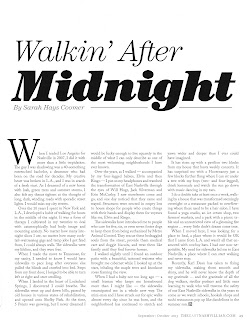Whoever decided January 1st should be the day we all dust
off and try to become new and improved hasn’t visited the sunken hole in my
couch that appears every winter, filled with wool blankets, microwave popcorn,
and smudged dark chocolate.
Winter is a time for hibernation and rest. It’s a time to
recharge, not to jump up at 5 a.m. in sub-zero temperatures and hit the park
for boot camp. When it’s cold outside, our bodies naturally yearn for hot, hearty,
nurturing food, not un-ripened, rock-solid fruit that’s been shipped from
far-flung tropical climates.
As a personal trainer, I get a lot of phone calls in January
from well-meaning people who are ready to “get to it! lose some weight!” But
most of them slip away within about six weeks, and that’s being generous. They
misplace their ability to find the GPS co-ordinates of the gym somewhere around
the third week of the month, arriving late or not at all.
My work is most rewarding when people come to me, ready to
make a significant change, and devote themselves to the long process of
transformation—come what may. Breakthroughs like that come from the inside.
They aren’t generally triggered by an external, predetermined event like New
Year’s Day.
For most people, the resolve to change comes after many
months or years of struggle with seemingly insurmountable, destructive habits.
The impulse comes at the moment they can’t tolerate feeling crappy anymore, a
lot crappier than they used to. It comes when they can’t bear another day
squeezing into clothes that don’t fit and eating enough for two in front of the
TV at night, before reprimanding themselves and curling up in bed to sleep it
off.
It feels good to get moving after the holidays, to eat a
little cleaner and drink a little less. It’s an ordinary, reasonable thing to
do, and most people start to feel better after a week or so. With that relief,
comes forgetfulness. We turn our attention back to regular life. Any big goals
we set over the holidays wither and flatten like sparkling wine in a
confetti-embossed, plastic champagne glass.
The air reeks with failure during January and February. The
dropping of New Year’s resolutions is a cultural norm. We all do it. Late-night
television hosts joke about it along with the rest of us. Just recently, I
realized that I utterly failed at my objective to cook one new healthy recipe
per week in 2013. I made one recipe—one out of fifty-two. Total fail. And,
what’s worse, I didn’t even notice until 11 months later.
To make a real change, it’s best not to attach new behavior
to the turning of the year. Begin building new habits in January if you want,
but be prepared for the arrival of spring before the new routine becomes second nature. Know
that your resolve will weaken. Your muscles will ache, and bones will creak as
you begin to move. Your body will cry out for relief in the first days and
weeks as you try to kick sugar, cheese, or cigarettes. Expect to rage against
yourself, and find someone you can call or text to hold you accountable as you
face the anonymous lure of sundown each night.
Make your change on December 28th or February 6th. Do it on
a day when you feel like you have no choice. Do it because you’ll lose touch
with the person you want to be going forward if you don’t.
Do it because it’s time, not because it’s New Year’s Eve.
(This story appears in the Jan/Feb 2014 issue of The East Nashvillian)










.jpg)










.JPG)